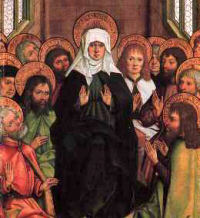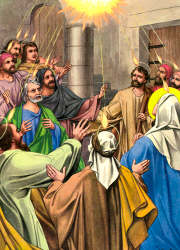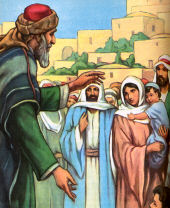Pope Francis celebrated Mass on Pentecost in St. Peter’s Basilica, reminding the faithful that “the Holy Spirit is the one who brings together the many; and that the Church was born this way: we are all different, yet united by the same Holy Spirit.”
A limited number of people attended the Mass, wearing face masks and sitting in “social distance” from one another. Rome is opening up to some degree from the pandemic restrictions but health protocols of the Covid-19 pandemic are still in place in Italy and the Vatican.
“Let us go back to the origin of the Church, to the day of Pentecost,” the Holy Father exhorted during his homily at Mass. “Let us look at the Apostles: some of them were fishermen, simple people accustomed to living by the work of their hands, but there were also others, like Matthew, who was an educated tax collector.
“They were from different backgrounds and social contexts, and they had Hebrew and Greek names. In terms of character, some were meek and others were excitable; they all had different ideas and sensibilities. They were all different. Jesus did not change them; he did not make them into a set of pre-packaged models. No. He left their differences and now he unites them by anointing them with the Holy Spirit.
“With the anointing comes their union – union in diversity. At Pentecost, the Apostles understand the unifying power of the Spirit. They see it with their own eyes when everyone, though speaking in different languages, comes together as one people: the people of God, shaped by the Spirit, who weaves unity from diversity and bestows harmony because in the Spirit there is harmony. He himself is harmony.”
Following is the Pope’s full homily, provided by the Vatican:
“There are different kinds of spiritual gifts, but the same Spirit” (1 Cor 12:4), as the Apostle Paul writes to the Corinthians. He continues: “There are different forms of service, but the same Lord; there are different workings but the same God who produces all of them in everyone” (vv. 5-6). Diversity and unity: Saint Paul puts together two words that seem contradictory. He wants to tell us that the Holy Spirit is the one who brings together the many; and that the Church was born this way: we are all different, yet united by the same Holy Spirit.
Let us go back to the origin of the Church, to the day of Pentecost. Let us look at the Apostles: some of them were fishermen, simple people accustomed to living by the work of their hands, but there were also others, like Matthew, who was an educated tax collector. They were from different backgrounds and social contexts, and they had Hebrew and Greek names. In terms of character, some were meek and others were excitable; they all had different ideas and sensibilities. They were all different. Jesus did not change them; he did not make them into a set of pre-packaged models. No. He left their differences and now he unites them by anointing them with the Holy Spirit. With the anointing comes their union – union in diversity. At Pentecost, the Apostles understand the unifying power of the Spirit. They see it with their own eyes when everyone, though speaking in different languages, comes together as one people: the people of God, shaped by the Spirit, who weaves unity from diversity and bestows harmony because in the Spirit there is harmony. He himself is harmony.
Let us now focus on ourselves, the Church of today. We can ask ourselves: “What is it that unites us, what is the basis of our unity?”. We too have our differences, for example: of opinions, choices, sensibilities. But the temptation is always fiercely to defend our ideas, believing them to be good for everybody and agreeing only with those who think as we do. This is a bad temptation that brings division. But this is a faith created in our own image; it is not what the Spirit wants. We might think that what unite us are our beliefs and our morality. But there is much more: our principle of unity is the Holy Spirit. He reminds us that first of all we are God’s beloved children; all equal, in this respect, and all different. The Spirit comes to us, in our differences and difficulties, to tell us that we have one Lord – Jesus – and one Father and that for this reason, we are brothers and sisters! Let us begin anew from here; let us look at the Church with the eyes of the Spirit and not as the world does. The world sees us only as on the right or left, with one ideology or the other; the Spirit sees us as sons and daughters of the Father and brothers and sisters of Jesus. The world sees conservatives and progressives; the Spirit sees children of God. A worldly gaze sees structures to be made more efficient; a spiritual gaze sees brothers and sisters pleading for mercy. The Spirit loves us and knows everyone’s place in the grand scheme of things: for him, we are not bits of confetti blown about by the wind, rather we are irreplaceable fragments in his mosaic.
If we go back to the day of Pentecost, we discover that the first task of the Church is proclamation. Yet we also see that the Apostles devised no strategy; when they were locked in there, in the Upper Room, they were not strategizing, no, they were not drafting any pastoral plan. They could have divided people into groups according to their roots, speaking first to those close by and then to those far away, in an orderly manner… They could have also waited a while before beginning their preaching in order to understand more deeply the teachings of Jesus, so as to avoid risks… No. The Spirit does not want the memory of the Master to be cultivated in small groups locked in upper rooms where it is easy to “nest”. This is a terrible disease that can also infect the Church: making her into a nest instead of a community, a family or a Mother. The Spirit himself opens doors and pushes us to press beyond what has already been said and done, beyond the precincts of a timid and wary faith. In the world, unless there is tight organization and a clear strategy, things fall apart. In the Church, however, the Spirit guarantees unity to those who proclaim the message. The Apostles set off: unprepared, yet putting their lives on the line. One thing kept them going: the desire to give what they received. The opening part of the First Letter of Saint John is beautiful: “that which we have seen and heard we proclaim also to you” (cf. 1:3).
Here we come to understand what the secret of unity is, the secret of the Spirit. The secret of unity in the Church, the secret of the Spirit is gift. For the Spirit himself is gift: he lives by giving himself and in this way he keeps us together, making us sharers in the same gift. It is important to believe that God is gift, that he acts not by taking away, but by giving. Why is this important? Because our way of being believers depends on how we understand God. If we have in mind a God who takes away and who imposes himself, we too will want to take away and impose ourselves: occupying spaces, demanding recognition, seeking power. But if we have in our hearts a God who is gift, everything changes. If we realize that what we are is his gift, free and unmerited, then we too will want to make our lives a gift. By loving humbly, serving freely and joyfully, we will offer to the world the true image of God. The Spirit, the living memory of the Church, reminds us that we are born from a gift and that we grow by giving: not by holding on but by giving of ourselves.
Dear brothers and sisters, let us look within and ask ourselves what prevents us from giving ourselves. There are, so to speak, three main enemies of the gift, always lurking at the door of our hearts: narcissism, victimhood and pessimism. Narcissism makes us idolize ourselves, to be concerned only with what is good for us. The narcissist thinks: “Life is good if I profit from it”. So he or she ends up saying: “Why should I give myself to others?”. In this time of pandemic, how wrong narcissism is: the tendency to think only of our own needs, to be indifferent to those of others, and not to admit our own frailties and mistakes. But the second enemy, victimhood, is equally dangerous. Victims complain every day about their neighbor: “No one understands me, no one helps me, no one loves me, everyone has it in for me!”. How many times have we not heard these complaints! The victim’s heart is closed, as he or she asks, “Why aren’t others concerned about me?”. In the crisis, we are experiencing, how ugly victimhood is! Thinking that no one understands us and experiences what we experience. This is victimhood. Finally, there is pessimism. Here the unending complaint is: “Nothing is going well, society, politics, the Church…”. The pessimist gets angry with the world, but sits back and does nothing, thinking: “What good is giving? That is useless”. At this moment, in the great effort of beginning anew, how damaging is pessimism, the tendency to see everything in the worst light, and to keep saying that nothing will return as before! When someone thinks this way, the one thing that certainly does not return is hope. In these three – the narcissist idol of the mirror, the mirror-god; the complaint-god: “I feel human only when I complain”; and the negativity-god: “everything is dark, the future is bleak” – we experience a famine of hope and we need to appreciate the gift of life, the gift that each of us is. We need the Holy Spirit, the gift of God who heals us of narcissism, victimhood, and pessimism. He heals us from the mirror, complaints, and darkness.
Brothers and sisters, let us pray to him: Holy Spirit, memory of God, revive in us the memory of the gift received. Free us from the paralysis of selfishness and awaken in us the desire to serve, to do good. Even worse than this crisis is the tragedy of squandering it by closing in on ourselves. Come, Holy Spirit: you are harmony; make us builders of unity. You always give yourself; grant us the courage to go out of ourselves, to love and help each other, in order to become one family. Amen.




 The descent upon the apostles was internal and invisible in nature although accompanied by certain visible phenomena. There came a mighty roar, like the onrush of a violent wind. It came suddenly, from heaven; but unlike storms that strike a structure from without, this one penetrated and filled the room where the disciples were gathered. Therefore it was not a natural wind, it was a miracle peculiar to the occasion. A second visible sign consisted in tongues of fire that descended upon each one present. These fiery tongues gave visible evidence that the Holy Spirit had descended upon them.
The descent upon the apostles was internal and invisible in nature although accompanied by certain visible phenomena. There came a mighty roar, like the onrush of a violent wind. It came suddenly, from heaven; but unlike storms that strike a structure from without, this one penetrated and filled the room where the disciples were gathered. Therefore it was not a natural wind, it was a miracle peculiar to the occasion. A second visible sign consisted in tongues of fire that descended upon each one present. These fiery tongues gave visible evidence that the Holy Spirit had descended upon them. But the malicious too were present; they had the answer. Nothing marvelous at all! Those Galileans were simply drunk, and their drunken babble sounded like a foreign language! Peter showed no hesitation in answering the charge. None of their number, he said, were intoxicated; it was but nine o'clock in the morning, and at that hour men usually are sober. What the multitude saw was, in fact, the fulfillment of Joel's prophecy: In those days (of the Messiah), God will pour forth His Spirit upon men and they will prophesy. . . . Then the apostle pointed his words more directly against the accusers: they had killed Jesus, had nailed Him to the Cross; but God had awakened Him and after His departure to heaven, He sent the Holy Spirit.
But the malicious too were present; they had the answer. Nothing marvelous at all! Those Galileans were simply drunk, and their drunken babble sounded like a foreign language! Peter showed no hesitation in answering the charge. None of their number, he said, were intoxicated; it was but nine o'clock in the morning, and at that hour men usually are sober. What the multitude saw was, in fact, the fulfillment of Joel's prophecy: In those days (of the Messiah), God will pour forth His Spirit upon men and they will prophesy. . . . Then the apostle pointed his words more directly against the accusers: they had killed Jesus, had nailed Him to the Cross; but God had awakened Him and after His departure to heaven, He sent the Holy Spirit.